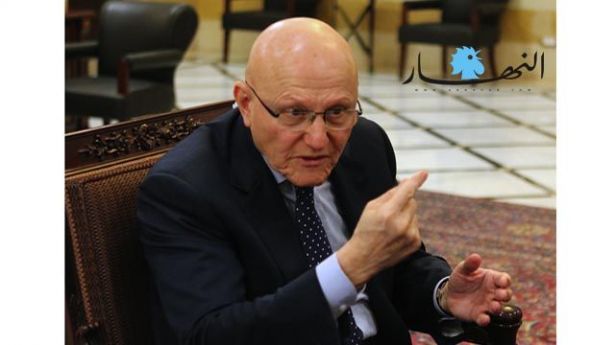No Lebanese Cabinet session yet as Aoun sticks to his guns
Hasan Lakkis| The Daily Star/Jun. 29, 2015 |
BEIRUT: Prime Minister Tammam Salam is still undecided on whether to call the Cabinet to meet as efforts to make MP Michel Aoun soften his unyielding stance on the issue of security and military appointments have failed, heralding an open-ended government crisis. Salam met with Speaker Nabih Berri Saturday in his latest consultations with the country’s rival politicians to end a widening rift over the appointment of senior military and security officers, a contentious issue which cast the Cabinet into paralysis on June 4, prompting the premier to suspend its sessions.
Referring to his meeting with Berri, who has repeatedly said he backed the resumption of Cabinet sessions, he said: “Speaker Nabih Berri still supports the Cabinet and the resumption of Cabinet sessions. This is what I felt during our meeting last Saturday.”Berri told his visitors Sunday that he informed Salam that his ministers would attend any Cabinet session Salam calls for “if this session is held [now] during the month of Ramadan or in two months.”
According to Berri, Salam is mulling calling for a Cabinet session either this week or next week and suggested holding three sessions: one to discuss military appointments, one to pursue deliberations on the state budget and a third one to discuss the Cabinet’s regular agenda.
Speaking to visitors at his Moseitbeh residence Sunday, Salam said he was pursuing his efforts and contacting all the political parties in a bid to resolve the Cabinet crisis, now in its fourth week. “I am in contact with everyone. I have talked with Speaker Nabih Berri on everything. We need to try to reactivate the legislative branch of power and reactivate the Cabinet and Parliament. There is a partnership between the two [branches of power] despite the separation of power,” Salam was quoted as saying. Berri also told visitors that there is a possibility of initiating an exceptional round for Parliament if 13 ministers sign a special decree.
However, the premier struck a downbeat note on the current political stalemate, while warning of external risks threatening the country. “We cannot leave the country as it is. As I have said last Tuesday, I am not the one who is obstructing [the government’s work]. I am not the one who influences the political parties to face developments,” he said. “But I will carry on with the efforts. Like all the people, I am pessimistic about the stagnation amid internal developments and external risks. It is normal for us to make efforts. Everyone must make efforts to address matters and work toward meeting together.”
Noting that he and members of his Cabinet have been entrusted with safeguarding the country amid the yearlong presidential vacuum, Salam said: “Consensus among the political parties is required because this government is basically a coalition government. We are hoping for the situation to improve.”
Salam indirectly responded to a June 21 speech by the Free Patriotic Movement leader Aoun in which he refused to budge on the issue of security and military appointments and threatened to mobilize his supporters across Lebanon to press for the restoration of what he called “Christian rights.”
“The Christians in Lebanon are an essential component of this country’s existence and the homeland’s survival. I am in particular more aware than others of this situation and I have sacrificed several posts to preserve the country,” Salam said.
Backed by their allies in Hezbollah, the Marada Movement and the Tashnag Party, the FPM’s ministers have said they would not allow the Cabinet to discuss any topic before it addresses appointments of new security chiefs, including the appointment of Aoun’s son-in-law, Brig. Gen. Shamel Roukoz, the head of the Army Commando Unit, as Army commander. In response, the FPM’s political rivals have accused it of attempting to paralyze the government over the issue of security appointments.
Salam, according to visitors, said he had given time to study the attitudes and demands of the six ministers [the FPM ministers and their allies] which are opposed by the remaining 18 ministers. Ministerial sources said Salam’s speech delivered last Tuesday at an iftar of the Makassed Association in which he said that the Cabinet would meet and make decisions was meant only as a reminder that there is no final decision yet by the Cabinet’s main parties to topple it.
In the meantime, parliamentary sources in the FPM said Aoun is still adamant that it is the Cabinet’s constitutional and legal duty to approve the appointments in top security posts before anything else. The FPM’s ministers will attend any Cabinet session called by Salam, but will insist that security appointments are the first item on the agenda, the sources said. They added that no contacts had been made with Aoun either by Salam or any other party over the Cabinet crisis.
The sources said they did not believe that Salam would call for a session unless he obtained an agreement beforehand from the government’s parties. The same sources said the revival of Cabinet has become directly linked to the presidential election and that the conflict management which led to the formation of this Cabinet in February last year has come to an end.
Parliamentary sources in the March 14 coalition are still holding the March 8 alliance, namely Hezbollah and the FPM, responsible for the paralysis in all state institutions. The sources urged Salam to stop taking the March 8 parties’ stances into account and to call for a Cabinet session with whoever attends, saying that the sectarian representation in the Cabinet as stipulated by the National Pact and legality of sessions are secured.























